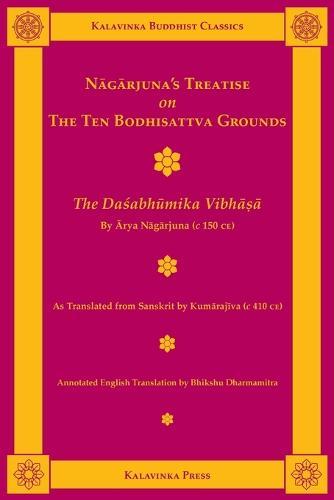Overview
"""Nāgārjuna's Treatise on the Ten Bodhisattva Grounds"" is Bhikshu Dharmamitra's extensively annotated original translation of Ārya Nāgārjuna's ""Daśabhūmika Vibhasa"" rendered from Tripiṭaka Master Kumārajīva's circa 410 ce Sanskrit-to-Chinese translation. It consists of 35 chapters that explain in great detail the cultivation of the ten highest levels of bodhisattva practice leading to buddhahood, focusing almost exclusively on the first two of the ten bodhisattva grounds. This is a work which has never been translated into English before."
Full Product Details
Author: Nagarjuna ,
Kumarajiva ,
Bhikshu Dharmamitra
Publisher: Kalavinka Press
Imprint: Kalavinka Press
Edition: Szpps-Eo_1019-1.0_paper ed.
Volume: 14B
Dimensions:
Width: 15.20cm
, Height: 4.20cm
, Length: 22.90cm
Weight: 1.075kg
ISBN: 9781935413165
ISBN 10: 1935413163
Pages: 746
Publication Date: 30 October 2019
Audience:
General/trade
,
General
Format: Paperback
Publisher's Status: Active
Availability: Available To Order

We have confirmation that this item is in stock with the supplier. It will be ordered in for you and dispatched immediately.
Reviews
What a rare and precious treasure a clear, readable, and accurate translation of Nagarjuna's Treatise on the Ten Grounds is! This treatise is found only in the Chinese canon, making its English translation especially precious for both Asian and Western Buddhists, since English is the common language at international Buddhist conferences and gatherings. Nagarjuna addresses our innermost spiritual yearnings for truth and freedom and shows us the path to actualize them. The Treatise on the Ten Grounds explains how to generate bodhicitta--the aspiration for full awakening in order to benefit living beings most effectively--and how to practice its ten foremost qualities by emphasizing the first two--generosity and ethical conduct. He explains how to have a truly generous and compassionate heart toward others and how to express that in our lives through living a life free from harm and violence. In today's world learning how to restrain our negative impulses and live ethically is needed more than ever. Ethical conduct is our personal contribution to world peace, for the actions of even one individual can adversely or positively influence the lives of everyone on the planet. So many social issues of our day--poverty, oppression, war, and climate change to name a few--can be reversed by generosity and ethical conduct. Nagarjuna's teachings are as important for the citizens of the planet now as they were for Buddhists centuries ago. Bhikshuni Thubten Chodron
Author Information
"Nāgārjuna (circa 150 ce) was one of the most brilliant, famous, influential, and universally respected Buddhist treatise masters and exegetes in the history of Indian Buddhism. Tripitaka Master Kumārajīva (344 - 413 ce) was one of the most prolific and popular of all translators in the history of Chinese Buddhism. Bhikshu Dharmamitra (ordination name ""Heng Shou"" - 釋恆授) is a Chinese-tradition translator-monk and one of the earliest American disciples (since 1968) of the late Guiyang Ch'an patriarch, Dharma teacher, and pioneer of Buddhism in the West, the Venerable Master Hsuan Hua (宣化上人). He has a total of 34 years in robes during two periods as a monastic (1969‒1975 & 1991 to the present). Dharmamitra's principal educational foundations as a translator of Sino-Buddhist Classical Chinese lie in four years of intensive monastic training and Chinese-language study of classic Mahāyāna texts in a small-group setting under Master Hsuan Hua (1968-1972), undergraduate Chinese language study at Portland State University, a year of intensive one-on-one Classical Chinese study at the Fu Jen University Language Center near Taipei, two years of course work at the University of Washington's Department of Asian Languages and Literature (1988-90), and an additional three years of auditing graduate courses and seminars in Classical Chinese readings, again at UW's Department of Asian Languages and Literature. Since taking robes again under Master Hua in 1991, Dharmamitra has devoted his energies primarily to study and translation of classic Mahāyāna texts with a special interest in works by Ārya Nāgārjuna and related authors. To date, he has translated more than fifteen important texts comprising approximately 150 fascicles, including most recently the 80-fascicle Avataṃsaka Sūtra (the ""Flower Adornment Sutra""), Nāgārjuna's 17-fascicle Daśabhūmika Vibhāśa (""Treatise on the Ten Grounds""), and the Daśabhūmika Sūtra (the ""Ten Grounds Sutra""), all of which are current or upcoming Kalavinka Press publications."




